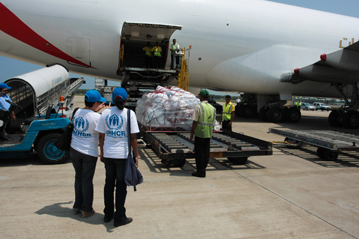Skilled Afghans return home with hopes for a prosperous Afghanistan
Skilled Afghans return home with hopes for a prosperous Afghanistan

PESHAWAR, Pakistan, July 11 (UNHCR) - For many Afghans in Pakistan, the dream of returning to their homeland never dies. Among them is 26-year-old Abdul Qadeer, who wants to go back to Afghanistan with more than a truckload of belongings accumulated in his 22 years of exile.
"I am pursuing a master's degree in zoology from the university in Peshawar, after which I would like to enrol myself for a doctorate degree," said Qadeer. "My desire is based upon the understanding that Afghanistan today needs more skilled and educated men to make it a prosperous country."
Qadeer's wife, two children, father and elder brother were among 70 families that left Peshawar on Tuesday, pushing this year's UNHCR-facilitated voluntary repatriation of Afghans from Pakistan past the 100,000 mark. They include many skilled workers bringing their expertise back to rebuild their homeland.
Among this year's returnees are 15,278 domestic workers, 1,248 carpet weavers, 357 people in the education sector, 325 engineers and 115 from the medical profession. Others in the skilled category include legal practitioners, masons, plumbers, drivers, and agricultural and office workers - offering a variety of much-needed expertise to help rebuild Afghanistan.
"My family moved here from Kabul when I was only four," said Qadeer. "Today we have decided that we should return, but I will only be able to accompany them to our ancestral home and then I have to come back. I won't be able to stay away from my studies for long." He added that he would miss his family, especially his two sons.
Every day, Afghans approach UNHCR registration centres across Pakistan to benefit from the voluntary repatriation programme that has seen more than 2.84 million people return home from this country since the fall of the Taliban regime in Kabul in late 2001.
"Seeing skilled Afghans return home in large numbers helps to keep the hope of nation-building alive for Afghanistan," said John Andrew, the UNHCR officer-in-charge in Islamabad. "This shows a vote of confidence by Afghans in their government and in the efforts of the international community engaged in rebuilding a country out of rubble. Returnees have a strong sense of obligation to be part of that reconstruction."
The Afghan programme is the largest voluntary repatriation operation ever undertaken by UNHCR. The programme is governed by a tripartite agreement among UNHCR, Afghanistan and Pakistan that will expire in December.
UNHCR's assistance to returning Afghans includes a transport grant ranging from US$4 to US$37, depending on the final destination in Afghanistan. Each returnee gets an additional US$12 to help reintegration. Both grants are paid inside Afghanistan.
Just across from Qadeer's truck at the UNHCR iris verification centre in Peshawar, Jalalabad-bound Mohammad Rehman was trying to make his father understand where in Afghanistan the family would receive their assistance grant.
"I am a qualified driver and worked with a private firm in Peshawar for eight years," said Rehman. "Some of my friends in the same profession returned last year and are getting good salaries. This information helped me in deciding to repatriate."
The repatriation figures so far in 2006 include 64,100 from Pakistan's North-West Frontier Province, more than 18,000 from Balochistan, 9,500 from Sindh and some 10,000 from Punjab and the Islamabad area.
While there has been an increase in the number of skilled Afghans returning to Afghanistan, the pace of repatriation this year has slowed down compared to 2005. For example, 24,780 Afghans returned in June this year, down 66 percent from the 73,373 returns in June last year. Previous annual figures include some 450,000 Afghans returning from Pakistan in 2005; 383,598 in 2004; 343,074 in 2003; and 1.56 million in 2002.
"We know that the people remaining in Pakistan are those who have much more challenges in return and reintegration than those who have gone before," said Indrika Ratwatte, UNHCR's assistant representative in Pakistan. "Right now we are discussing with the Pakistani government what's the best way to manage the temporary stay of Afghans in Pakistan."
As Qadeer's truck left Peshawar, he joined more than 4.6 million Afghans who have returned home from asylum countries with UNHCR assistance since 2002. Pakistan and Iran continue to host the largest populations of Afghans outside Afghanistan. Some 2.6 million Afghans remain in Pakistan today, while more than 900,000 Afghans are believed to be still in Iran.
By Babar Baloch in Peshawar, Pakistan









